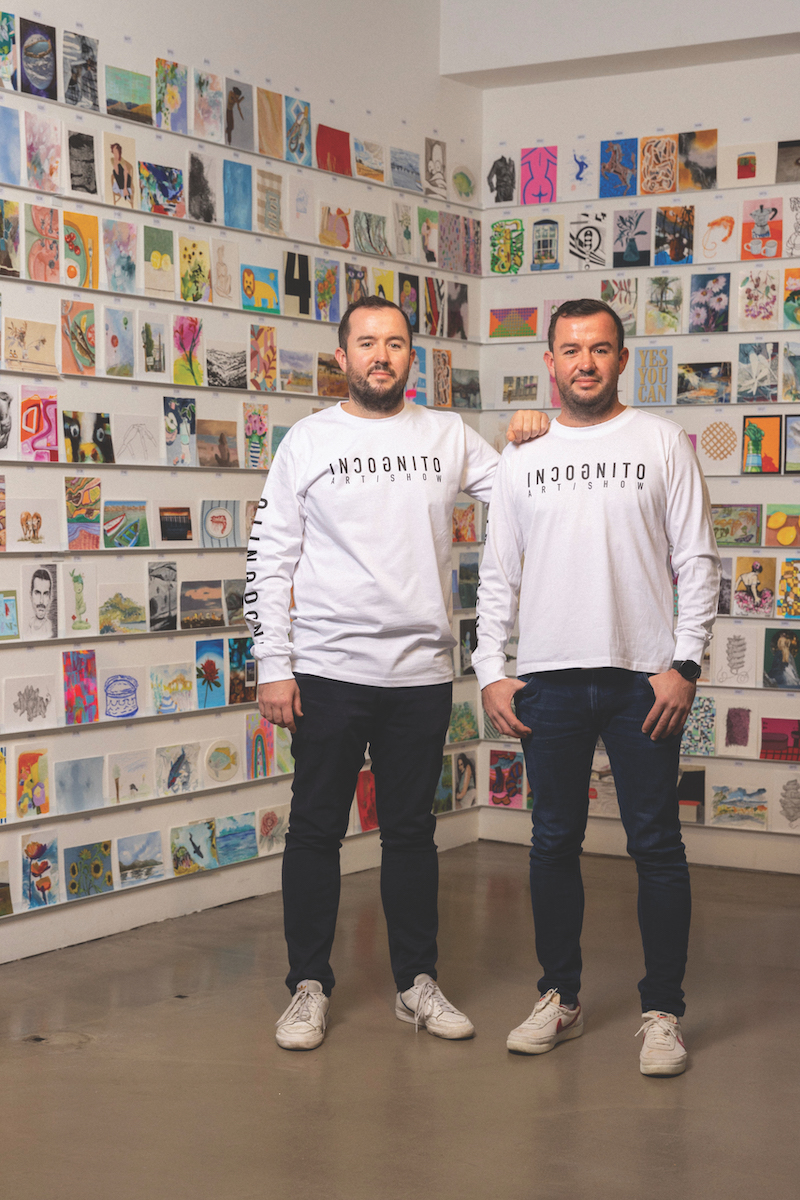While living in Ireland, David Liston attended an unusual fundraising art exhibition, where all works were anonymous and identically priced. Not only did he make his first purchase of original art, but the experience engaged Liston so deeply that he brought the concept back to Australia, approaching artist friend Laura Jones to discuss bringing the idea to life here.
Liston studied art history at university and is now a media and tech consultant. Together with his twin brother Ed Liston, Jones, Egle Dovydaityte, Lachlan Harris, and Zoe Paulsen, he founded the Incognito Art Show in 2021, the group leveraging their extensive skill sets and networks to build a show that engages artists and collectors to raise money for fellow artists.
More than many other professions, artists are regularly asked to contribute works for charity causes, readily obliging with valuable work. The Incognito team felt that the organisation benefiting from this generosity should in turn support artists. They chose Sydney-based Studio A, an organisation supporting artists with intellectual disability to practice as artists and participate in significant exhibitions, awards and public installations.
Works in Incognito are all priced at $100 and sold in-person on a first-come, first-serve basis, the artist’s name revealed after purchase. In 2022, the show’s second iteration, more than 3,500 artworks were contributed by 1,300 amateur, emerging and professional artists including numerous Archibald, Wynne and Sulman winners and finalists. Artists included Blak Douglas, Eliza Gosse, Jason Phu, Abdul Abdullah, Monica Rohan and Jasper Knight.
Permitted to buy no more than three works each, 1,000 collectors raised $55,000 for Studio A. As well as financially supporting Studio A, Incognito aims to provide emerging artists the opportunity to become professional. An open call for works results in an exhibition where all works, regardless of artist’s career stage, are exhibited anonymously and priced equally. After the show, all works are attributed and promoted online, growing artist visibility. Incognito also aims to develop a new generation of art collectors. With the cost barrier to entry for collecting lowered, collectors are inspired to buy further works by emerging and established artists after the show.
The statistics back up the show’s goals. Most significantly, the artists of Studio A benefit via increased awareness and by the donation which funds studio programs. On the participation side, 47% of exhibited artists saw commercial benefits from participating, with one in 10 receiving commissions or sales directly attributable to Incognito. One in three artists have grown their audiences by taking part (images of each work are shared with Incognito’s 11,500 Instagram followers) and 99.2% would participate again.
The show attracts a diverse range of collectors. Incognito has what Liston describes as a “hardcore supporter group that, for the last few years, waited up to 24 hours” for doors to open. For novice collectors, the flat price point and anonymity of artists presents an opportunity to look for work based on personal taste rather than the art world’s sometimes intimidating hierarchies.
Liston notes there is “no secret trick” to attracting so many artists to donate work, “just hardcore hustling,” contacting artists of all stripes. Jones and her artist networks were key, providing a significant starting point from which the callout snowballed.
Rather than request artwork donations of any format, all works are made on an identical A5 card. These are sent to artists with return envelopes, making the process of donating works straightforward – but this doesn’t mean the results are predictable. “Some artists [contribute work] that is distinctly their style, but some artists go off-piste and try something new,” Liston notes.
Phu has participated as an artist in the show since its inception, having known several of the show’s founders for a number of years and been aware of Studio A’s activities through previous work as a printmaker. “As an artist, you get a bit of lethargy around the amount of charities and fundraisers you get asked to do – not even from the giving side, just from the admin side,” Phu explains. He feels that Incognito’s structure makes participation straightforward, fun and casual. The minimal administrative burden placed on time-poor artists is another key to Incognito’s success, along with Jones, whose network of artist colleagues enables a personalisation of the various aspects of the process, from encouraging participation to in-person collection of completed artworks.
Along with the help of volunteers contributing time and energy to the exhibition, many businesses and contractors have donated free or discounted goods and services. With Incognito still in its infancy, the team is keen to expand it. Liston and his brother hail from regional NSW and have ambitions for a show in the bush, while other cities have also expressed interest, but longer-term sponsors will be needed to realise these dreams.
Overall, the project is about democratising access to art. “We want people to come in and buy art that they love, purely because they love it, and go on a journey of following the artists…as well as continuing to buy art – because at the end of the day, that’s how artists make money.”
“Often there is a view that art is inaccessible, and galleries are intimidating,” Liston continues, noting that the onus is on arts professionals “to keep innovating, keep coming up with fun, interesting ways to put art in front of people… There is an audience there, and we want to keep growing it.”
Featured Image: Co-founders of The Incognito Art Show David and Ed Liston at the 2021 Incognito art show held at Verona Studio in Paddington, Sydney. Photo: Dominic Lorrimer. Courtesy: Fairfax Media

